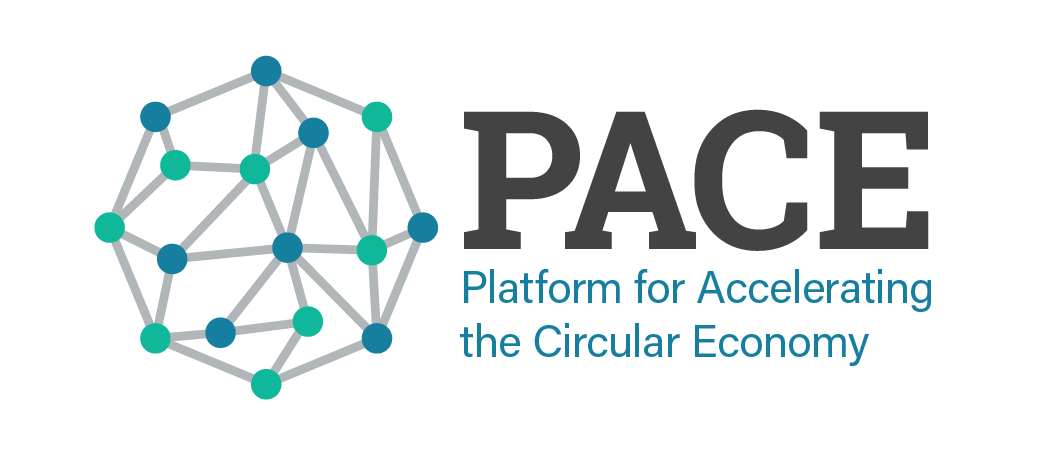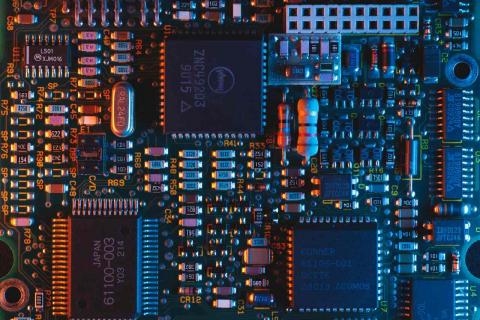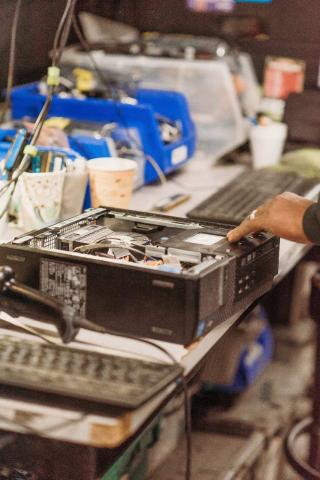Recycled or Renewable Resources used in Products
This Action aligns with the following Calls to Action from the Circular Economy Action Agenda for Electronics:
1. Incentivize and support product design for circularity
Ambition
This action supports the achievement of the Dell Technologies Advancing Sustainability Moonshoot Goal where, by 2030, more than half of Dell’s product content will be made from recycled or renewable material.
Through Recycled or Renewable Resources used in Products, Dell aims to increase recycled, renewable and closed-loop materials used in Dell products, namely Recycled Carbon Fiber, Closed loop plastics, Closed loop hard drive magnets, Closed loop aluminium in hard drives, Bioplastics made from tall oil (a byproduct from the paper making process).
Objectives
In FY2021, 3.9% of the material used in Dell Technologies products was made from recycled or renewable material content. This represents a 0.4 percentage point increase compared to the FY2020 baseline. During 2021 Dell Technologies is investigating the use of sustainable steel with the aim of increasing the recycled steel content in their products.
Partners
Dell Technologies
Free Consumer Recycling Globally
This Action aligns with the following Calls to Action from the Circular Economy Action Agenda for Electronics
5. Encourage bring-back by consumers
6. Set up effective collection systems
Ambition
This action supports the achievement of the Dell Technologies Advancing Sustainability Moonshoot Goal where, by 2030, for every product a customer buys, Dell will reuse or recycle an equivalent product.
Dell Technologies consumer recycling services make it easy for customers to trade-in, donate or responsibly recycle their used electronics of any brand for free. This also includes Dell Reconnect, a partnership with Goodwill Industries in the US that provides free electronics recycling, of any brand, at more than 2,000 participating Goodwill drop-off locations. Furthermore, these materials are recovered before they exit the economy and are reused or refurbished and resold to commodity markets.
Objectives
Dell Technologies recovered 9.6% of products sold to customers (this percentage is the total units collected for recycling and reuse over the number of products sold) in 2021, which represents a 0.5 percentage point increase compared to the FY2020 baseline. Future objectives include:
- Increase internal and external awareness of takeback offerings through strategic communications and marketing.
- Embed takeback into standard offers, sales tools, incentives and GTM strategies.
- Streamline return flows, optimize tools and processes and improves data reporting.
- Introduce new approaches through internal innovation and industry collaboration.
Partners
Dell Technologies
Greening with Jobs - World Employment and Social Outlook
PACE Partner the International Labour Organization (ILO) is contributing to the following Calls to Action from the Circular Economy Action Agenda:
- Integrate and advance decent work in the transition to a circular economy for electronics (Electronics, CTA 10; Textiles, CTA 9; Plastics, CTA 9)
Ambition
The report ‘Greening with Jobs - World Employment and Social Outlook 2018’ examines environmental sustainability in the world of work to support a strengthening of the global and regional partnerships in the area of skills development for a green transition. It aims to promote cross-border knowledge-sharing with regional and international approaches to skills development for the green transition, which can in turn address the competitiveness concerns of individual countries.
Objectives for 2021
This edition of the World Employment and Social Outlook focuses on how climate change and environmental degradation will impact the labour markets, affecting both the volume and quality of employment, and quantifies the shifts expected to take place within and between sectors. It shows that there is scope for policies in the world of work to advance environmental sustainability, and for environmental policies to ensure decent work. It acknowledges a coherent and integrated legal framework is a step in this direction and provides policy recommendations that combine decent work issues with environmental regulations, and provide workers with the right set of skills to transition to sectors with employment growth, and also to better jobs. Moreover, it underlines the urgent need to improve the understanding of the mechanisms through which a country-specific policy mix can have an impact on skills development for the green transition. In recognition of this need, the ILO is following up on the analysis with a view to developing detailed policy recommendations for each country that could lead to technical assistance to the countries surveyed.
Partners
ILO
Work Improvement for Safe Home Action Manual
This Action aligns with the following Calls to Action from the Circular Economy Action Agenda for Electronics
10. Integrate and advance decent work in the transition to a circular economy for electronics
Ambition
‘Work Improvement for Safe Home: Action manual for improving safety and health of E-waste workers’ aims to assist e-waste workers in improving their safety, health and working conditions by showing many low-cost ideas that can easily implemented using locally-available materials. Additionally, these ideas could improve productivity and efficiency on the workplace and support the growth and sustainability of their businesses.
Objectives
The manual consists of (1) a 22-item action checklist designed as an easy-to-apply tool for e-waste workers to identify and improve their OSH risks, and (2) 19 checkpoints about materials storage and handling, work-stations, safe use of machine and electricity, physical environment, welfare facilities and work organization to provide practical ideas for solutions.
Partners
ILO
Circular Economy Employment Modelling
PACE Partners International Institute for Sustainable Development (IISD) and Sitra are contributing to the following Calls to Action from the Circular Economy Action Agenda
- Integrate and advance decent work in the transition to a circular economy (Textiles, CTA 9; Electronics, CTA 10)
Ambition
Circular Economy Employment Modelling is an open access model that aims to measure the employment impacts of policies and sectoral actions for the circular economy. When locally-focused data is provided as input, this model can present the outcomes of circular economy interventions in any jurisdiction.
Objectives
The dynamic simulation model developed has been calibrated to the Finnish context to produce the report Circular Jobs in Finland - Modelling employment impacts resulting from circular economy interventions, published in November 2020. This report explores the outcomes of implementing circular economy interventions for selected products in consumer electronics and appliances, textiles, food, mining and scrap metals, forestry and paper production, and buildings.
Partners
International Institute for Sustainable Development (IISD), Sitra (PACE Partners)
Sustainable Business Model Innovation Framework
PACE Partner TNO is contributing to the following Calls to Action from the Circular Economy Action Agenda
-
Guide and Support New Business Models for Environmental, Financial, and Social Triple-Win (Electronics, CTA 4; Textiles, CTA 4; Plastics, CTA 5)
Ambition
The Sustainable Business Model Innovation Framework aims to support organizations to make a systemic shift to sustainable business. It assists the steps of the business model innovation process to support decision-making and attitudes towards circular and sustainable innovations. It combines multi-actor and multi-value business model design with multi-level analysis from the national, regional, sector and value chain economic structures, as well as impact and lifecycle analysis and material flow models and approaches.
Objectives for 2021
TNO has expanded its work on Sustainable Business Model Innovation. Currently, a portfolio of several projects on ‘collaborative business modelling’ has been set up and a broader team is working on several national and international applications in circularization of, among others, Smart Industry (Industry 4.0, Materials Passports and a circular business model typology), flooring industry, small food supply chains and food waste. In 2021, the focus lies on the expansion of the portfolio on Collaborative Business Modelling, on the concept for governance of the Materials Passports and on the community of practice in circularity and servitization in Smart Industry.
Partners
TNO (PACE Partner)
BoP Inc, Nyenrode Business University, The Next Organization, University of Twente
Rethinking Ownership
PACE Partner Sitra is contributing to the following Calls to Action from the Circular Economy Action Agenda
- Guide and Support New Business Models for Environmental, Financial, and Social Triple-Win (Plastics, CTA 5; Textiles, CTA 4; Electronics, CTA 4)
Ambition
The overall ambition of Rethinking Ownership is to change the narrative on product ownership and circularity. Through this action, Sitra seeks to support businesses in adopting producer ownership models to reduce the consumption of materials and extend product-life. Additionally, it aims to provide information for decision makers in the EU on how the producer ownership models and the EU's sustainable product policy framework are key for mainstreaming circular business models.
Objectives for 2021
Rethinking Ownership's report has been published in December 2020 and it outlines how, by 2030, companies will have transitioned from simply selling products to renting, maintenance and returns. Sitra is now organizing workshops, studies and events on the topic.
Partners
Sitra (PACE Partner)
Consumer Impact Action Panel - Electronics Club
PACE Partner Sitra is contributing to the following Calls to Action from the Circular Economy Action Agenda for Electronics
5. Encourage bring-back by consumers
6. Set up effective collection systems
3. Transform Consumption Modes to increase market demand for circular products and services
Ambition
The Consumer Insight Action Panel is a European multi-stakeholder initiative designed to support the transition to the circular economy by generating, applying and testing consumer behavioural insights in circular strategies. It aims to provide support to evidence-based policy and business circular economy innovations co-developed in collaboration with civil society organisations and think-tanks, through a better engagement and understanding of consumers.
As part of this initiative, the Electronics Club has brought together about ten organizations from different stakeholder groups in the electronics sector who are committed to better engage consumers, understand consumer behaviour and test behaviourally-informed approaches in retail stores, neighbourhoods and households to increase repairing of electronics, improve product maintenance and boost their returning through take-back schemes.
Objectives
In 2021, three pilot interventions on take-back schemes and the French repairability index will be performed and evaluated, also with the aid of a sustainability assessment framework prototype. Moreover, the club will interview experts on the topic of fairness in the circular economy, derive targeted policy recommendations and insights and provide club members with know-how and supporting materials to further improve their circular offers and engage consumers through circular strategies.
Partners
Sitra, CSCP, Deutsche Bundesstiftung Umwelt (DBU)
Pagination
- Page 1
- Next page








